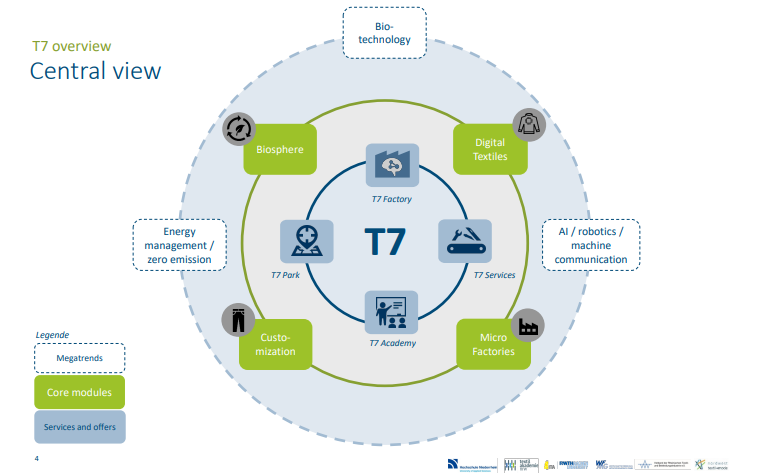The European textile and garment industry is on the brink of a major transformation, driven by the innovative Textile Factory 7.0 (T7) project. The T7 project is a joint venture spearheaded by the Niederrhein University of Applied Sciences, the Institute of Textile Technology (ITA) at RWTH Aachen University, the Association of the Northwest German Textile and Clothing Industry, the Association of the Rhenish Textile and Clothing Industry, the Textile Academy NRW, and Wirtschaftsförderung Mönchengladbach GmbH. This consortium of experts and stakeholders aims to integrate cutting-edge technologies with sustainable practices to redefine the European textile industry.
As a collaborative effort involving academic institutions, industry associations, and leading manufacturers, T7 is set to revolutionize how textiles are made, bringing production closer to markets and setting new standards for the industry.
Innovative Technologies Driving T7
The T7 project leverages a range of advanced technologies to achieve its objectives:
- Automated Cutting and Handling Systems
Automation plays a crucial role in the T7 initiative. Automated cutting machines, including laser and water jet cutters, provide precise and efficient fabric cutting. Robotic systems equipped with specialized grippers handle fabrics delicately, adapting to different textile types and shapes. These technologies significantly reduce waste and increase production speed.
- Digital Fabric Management
Digitalization is another pillar of T7. The project employs sophisticated software solutions for pattern digitization, production planning, and real-time monitoring. These systems optimize production workflows, ensure consistent quality, and enable manufacturers to quickly adapt to changing market trends.
- Smart Factories and Industry 4.0
T7 envisions the creation of smart factories, where interconnected machines and sensors collect and analyze data to improve operational efficiency. This Industry 4.0 approach allows for predictive maintenance, energy management, and seamless integration of various production stages, resulting in a highly efficient manufacturing environment.
Case Study: C&A’s Factory for Innovation in Textiles (FIT)
One of the notable implementations of the T7 project is the Factory for Innovation in Textiles (FIT) by C&A in Mönchengladbach. This pilot project exemplifies the principles of T7, bringing a portion of C&A’s jeans production back from Asia to Europe. FIT focuses on innovative technology, carbon-neutral production, and sustainable fashion.
C&A’s FIT utilizes highly automated manufacturing lines developed in collaboration with Robotextile and other T7 partners. The factory aims to produce up to 800,000 pairs of jeans annually, demonstrating that large-scale production can be both sustainable and economically viable.
The Future of Textile Manufacturing
The Textile Factory 7.0 project represents a significant step forward for the European textile industry. By prioritizing sustainability, embracing technological advancements, and promoting nearshoring, T7 is setting new benchmarks for textile manufacturing. It promises to transform the European textile sector into a global leader in sustainable and technologically advanced manufacturing. This initiative not only benefits the environment and local economies but also positions Europe as a competitive force in the global textile market.
In conclusion, the Textile Factory 7.0 project is a groundbreaking effort that highlights the potential of combining sustainability with technological innovation. It serves as a model for future manufacturing practices, proving that the textile industry can thrive by embracing change and prioritizing environmental and economic sustainability.
